考点 _ 初中英语重点短语辨析汇总
初中英语重点短语辨析

初中英语重点短语辨析1. be made of / be made fromⅠ. be made of “由……制成/造”成品看得出原料。
如:The desk is made of wood. 这张桌子是木头制成的。
Ⅱ. be made from “由……制造/成”成品看不出原料。
如;Paper is made from rags.纸是由破布做的。
(已看不出原料)2. be pleased with/ at/ toⅠ. be pleased with “对……人/物,感到满意”介词with后接人或物。
如:① Both Mark and her mother were pleased with the girl. 马克和他妈妈都有喜欢这个女孩。
② I wasn’t very pleased with / at my exam results. 我对自己的考试成绩不太满意。
Ⅱ. be pleased at “对……某事/物,感到满意”。
介词at 常与事物搭配使用。
He was very pleased at the news.他对这个消息感到很满意。
Ⅲ. be pleased to “乐意……;因……而高兴”。
to 不是介词,而是小品词。
后接动词原形。
如:① I shall be pleased to go. 我将乐意去。
② We are quite pleased to be working in this country. 能在这个国家工作,我们是十分高兴的。
3. be sure of/ be sure to do/ be sure thatⅠ.be sure of “确信对……有把握”后接名词、代词或动词-ing 形式,表对客观事物有肯定的认识和判断,主语必须是人。
如:① As David joined our team, we are sure of winning the game this time.由于David参加了我们的球队,我们这次有把握取胜。
初中英语动词及动词短语考点
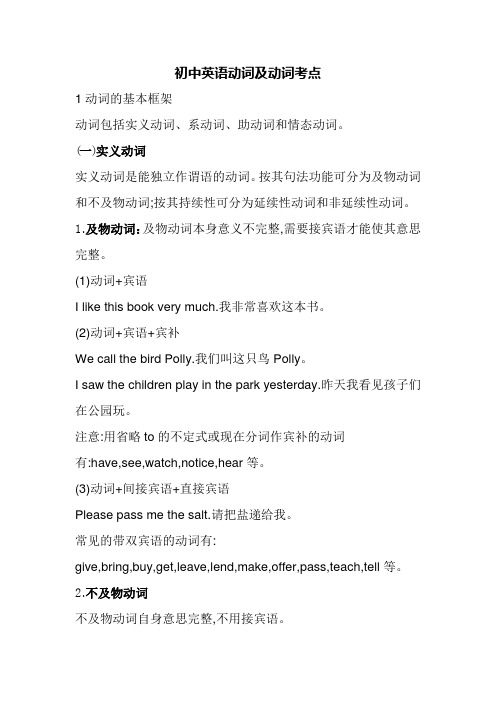
初中英语动词及动词考点1动词的基本框架动词包括实义动词、系动词、助动词和情态动词。
(一)实义动词实义动词是能独立作谓语的动词。
按其句法功能可分为及物动词和不及物动词;按其持续性可分为延续性动词和非延续性动词。
1.及物动词:及物动词本身意义不完整,需要接宾语才能使其意思完整。
(1)动词+宾语I like this book very much.我非常喜欢这本书。
(2)动词+宾语+宾补We call the bird Polly.我们叫这只鸟Polly。
I saw the children play in the park yesterday.昨天我看见孩子们在公园玩。
注意:用省略to的不定式或现在分词作宾补的动词有:have,see,watch,notice,hear等。
(3)动词+间接宾语+直接宾语Please pass me the salt.请把盐递给我。
常见的带双宾语的动词有:give,bring,buy,get,leave,lend,make,offer,pass,teach,tell等。
2.不及物动词不及物动词自身意思完整,不用接宾语。
Horses run fast.马跑得快。
(1)有些动词既可作及物动词又可作不及物动词。
We study English.我们学习英语。
(及物动词)We study hard.我们努力学习。
(不及物动词)(2)有些不及物动词与一些别的词搭配在一起构成动词短语,它的作用相当于一个及物动词。
①动词+介词Listen to the teacher carefully.仔细听老师讲。
此类动词短语后面的宾语无论是名词还是代词,都只能放在介词后面,不能放在动词和介词之间。
②动词+副词+介词Let’s go on with our work!让我们继续我们的工作吧!He gets along well with his classmates.他与他的同学们相处得很好。
初中英语短语、词组及重点句型归纳
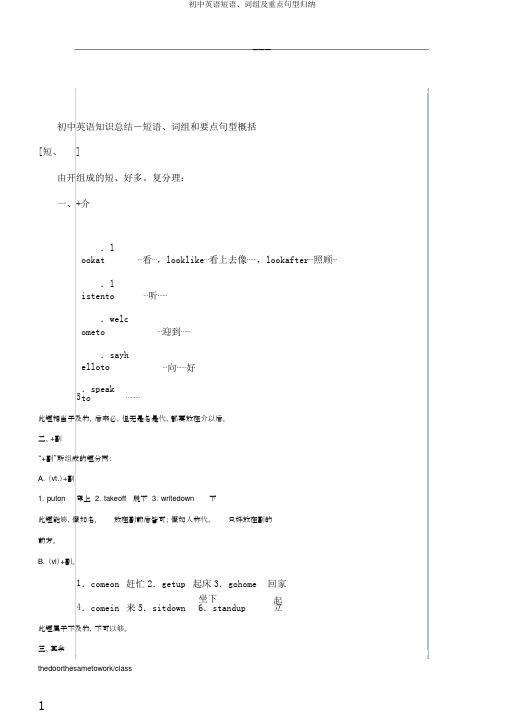
---初中英语知识总结-短语、词组和要点句型概括[短、]由开组成的短、好多。
复分理:一、+介.lookat⋯看⋯,looklike⋯看上去像⋯⋯,lookafter⋯照顾⋯.listento⋯听⋯⋯.welcometo⋯迎到⋯⋯.sayhelloto⋯向⋯⋯好5.speakto⋯⋯⋯此短相当于及物,后来必,但无是名是代,都要放在介以后。
二、+副“+副”所组成的短分两:A.(vt.)+副1.puton穿上2.takeoff脱下3.writedown下此短能够,假如名,放在副前后皆可;假如人称代,只好放在副的前方。
B.(vi)+副。
1.comeon赶忙2.getup起床3.gohome回家4.comein来5.sitdown 坐下6.standup起立此短属于不及物,不可以够。
illalook/seatsupperyoungshoppingTV/games-----10.playgames[介短聚焦]“介+名/代”所组成的短称介短。
将Unitsl-16常用的介短按用法行。
1.in+言/色/衣帽等,表示使用某种言或衣着⋯⋯。
2.in+Row/Team/Class/Grade等,表示“在⋯⋯排//班/年”等。
3.inthemorning/afternoon/evening/表示“在上午/下午/夜晚”等一段。
4.inthedesk/pencil-box/bedroom等表示“在桌/笔盒/寝室里”。
5.inthetree表示“在上(非自己全部)”;onthetree表示“在上(自己全部)”。
6.inthewall表示“在上(凹陷去)”;onthewall表示“在上(指的表面)”。
7.atwork(在工作)/atschool(上学)/athome(在家)注意此短中无the。
8.at+刻表示点。
9.likethis/that表示方式,意“像⋯⋯/那”。
10.of短表示所属关系。
11.behind/beside/near/under+名等,表示方向、所。
初中英语考查频率最高的50个短语以及易混易错词汇辨析100组!

初中英语考查频率最高的50个短语以及易混易错词汇辨析100组!1.agree with 同意...的意见(想法)I can’t agree with you about that.就那件事,我无法同意你的看法。
2.1isten to 听…When she arrived, I was listening to English.她来的时候,我正在听英语。
3.get to 到达I get to school at about 7:30 every day,and I get home at 5:00 in the afternoon.我每天7:30到校,下午5:00到家。
4.fall off (从……) 掉下The girl fell off the bike.女孩从自行车上摔了下来。
5.knock at/on 敲(门、窗)There was a heavy knock at the door.有人在猛烈地敲门。
ugh at 嘲笑It’s not good to laugh at a person who is in trouble.讥笑一个陷于困境的人是不好的。
7.1earn(…)from…向…学习...Bob, you should learn from your brother. He does well in his homework.鲍勃,你应该向你哥哥学习。
他的作业完成得很好。
8.1ive on 继续存在;靠…为生People in my hometown live on rice.我家乡的人们靠大米为生。
9.1ook after 照顾,照看I must look after my old grandma when my parents are not at home.父母不在家时,我必须照顾我的老奶奶.10.help…with 帮助…做…My friend helps me with my English study.我的朋友帮助我学习英语。
(完整word版)初中英语短语、词组和重点句型归纳
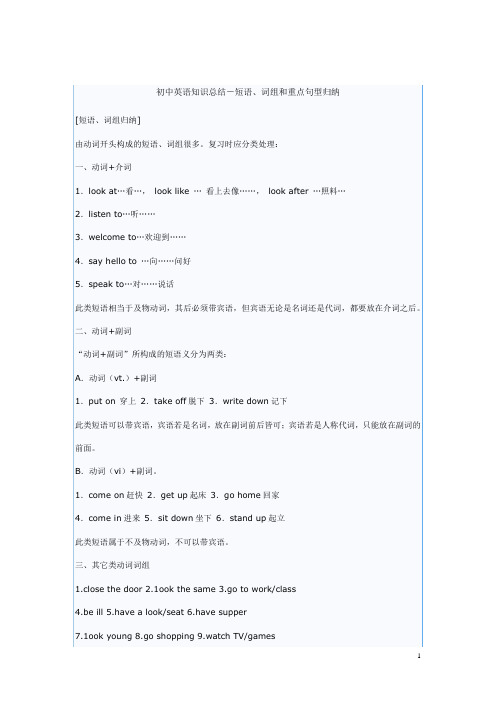
2.in+ Row/ Team/ Class/ Grade等,表示“在……排/队/班级/年级”等。
3.in the morning/ afternoon/evening/表示“在上午/下午/傍晚”等一段时间。
4.in the desk/ pencil-box/bedroom等表示“在书桌/铅笔盒/卧室里”。
7.be famous for因……而著名
8. on ones way to在……途中
9. be sick/ill inhospital生病住院
10. at the end of在……的尽头,在……的末尾
11. wait for等待
12. in time及时
13. make one’s way to…往……(艰难地)走去
10.ask sb.(not) to do sth.意为“让某人(不要)做某事”,其中ask sb.后应接动词不定式,
11.show sb. sth. / show sth. to do.意为“把某物给某人看”,该句型的用法同前面第2点。
12.introduce sb. to sb.意为“把某人介绍给另一人”;introduce tosb.则是“向某人作介绍”。
5.speakto…对……说话
此类短语相当于及物动词,其后必须带宾语,但宾语无论是名词还是代词,都要放在介词之后。
二、动词+副词
“动词+副词”所构成的短语义分为两类:
A.动词(vt.)+副词
1.puton穿上2.take off脱下3.writedown记下
此类短语可以带宾语,宾语若是名词,放在副词前后皆可;宾语若是人称代词,只能放在副词的前面。
初中英语常用词语辨析大全
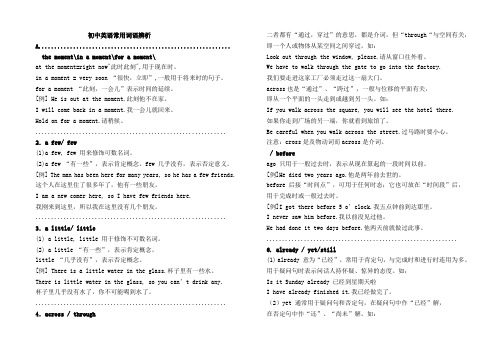
初中英语常用词语辨析A.............................................................the moment\in a moment\for a moment\at the moment=right now"此时此刻",用于现在时。
in a moment = very soon “很快,立即”,一般用于将来时的句子。
for a moment “此刻,一会儿”表示时间的延续。
[例] He is out at the moment.此刻他不在家。
I will come back in a moment.我一会儿就回来。
Hold on for a moment.请稍候。
............................................................. 2.a few/ few(1)a few, few 用来修饰可数名词。
(2)a few “有一些”,表示肯定概念,few 几乎没有,表示否定意义。
[例] The man has been here for many years, so he has a few friends. 这个人在这里住了很多年了,他有一些朋友。
I am a new comer here, so I have few friends here.我刚来到这里,所以我在这里没有几个朋友。
............................................................. 3.a little/ little(1) a little, little 用于修饰不可数名词。
(2) a little “有一些”,表示肯定概念。
little “几乎没有”,表示否定概念。
[例] There is a little water in the glass.杯子里有一些水。
初中英语九年级英语重点词汇短语词义辨析归纳(全一册)

情报”指通过学习、阅读、
那本书获取了一些信息。
观察等方式而得到的信息
为不可数名词,意为“新闻;
消息”,指由广播、电视、 报纸等传播的最新消息。
I watch news on TV every day.我每天在电 视上看新闻。
为可数名词,意为“口信; 消息”,指可以传播的信息。
Can you take some messages for her?你能 捎一些消息给她吗?
Edison invented the electric light. 爱迪生发明了电灯。
辨析so…that…与so that
考点
词义及用法
so…that…
so+adj./adv.+that…意为“如此……以至 于……”,引导结果状语从句
例句
The girl is so young that she can't dress herself.这个女孩还太小,不会自己穿 衣服。
用于做错事道歉、没听清对 Please pardon me for not arriving soon.请原谅我没能 方的话,希望他重复一遍等。早点来。
辨析information,news和message
考点 information
news
message
用法
常用短语
例句
不可数名词,意为“信息; a piece of information I get some information from that book.我从
辨析aloud,loud与loudly
考点
词义及用法
例句
aloud(adv.)
意为“大声地”,与call,shout,cry等 Please read the text aloud.请大声地朗读 连用;意为“出声地”,与read等连用 课文。
初中英语的知识点汇总
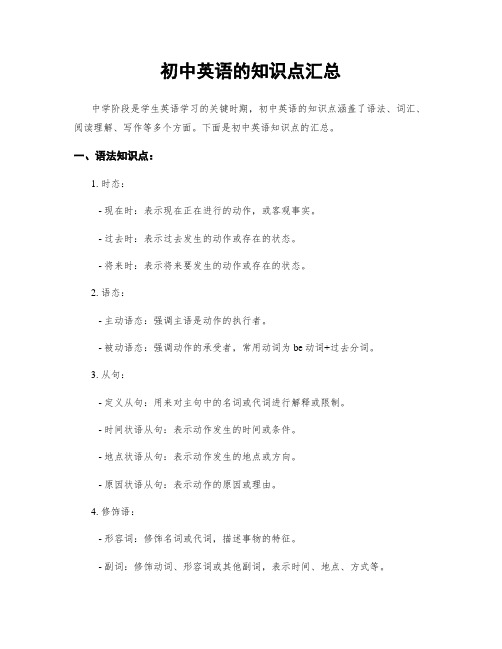
初中英语的知识点汇总中学阶段是学生英语学习的关键时期,初中英语的知识点涵盖了语法、词汇、阅读理解、写作等多个方面。
下面是初中英语知识点的汇总。
一、语法知识点:1. 时态:- 现在时:表示现在正在进行的动作,或客观事实。
- 过去时:表示过去发生的动作或存在的状态。
- 将来时:表示将来要发生的动作或存在的状态。
2. 语态:- 主动语态:强调主语是动作的执行者。
- 被动语态:强调动作的承受者,常用动词为be动词+过去分词。
3. 从句:- 定义从句:用来对主句中的名词或代词进行解释或限制。
- 时间状语从句:表示动作发生的时间或条件。
- 地点状语从句:表示动作发生的地点或方向。
- 原因状语从句:表示动作的原因或理由。
4. 修饰语:- 形容词:修饰名词或代词,描述事物的特征。
- 副词:修饰动词、形容词或其他副词,表示时间、地点、方式等。
- 介词短语:用介词+名词构成,表示时间、地点、原因等。
5. 比较级和最高级:- 比较级:用于比较两个事物的差异,形容词后加-er,副词前加more。
- 最高级:用于比较三个或三个以上的事物之间的差异,形容词前加the,副词前加most。
二、词汇知识点:1. 同义词和反义词:- 同义词:意思相同或相似的词。
- 反义词:意思相反的词。
2. 词根与词缀:- 词根:单词的核心部分,决定单词的基本含义。
- 词缀:附加在词根上的部分,能改变词根的词类或意义。
3. 词组和固定搭配:- 词组:含有两个或多个词的组合,有固定的搭配方式。
- 固定搭配:几个词在意义上紧密结合,不能随意改动。
4. 词义辨析:- 同音异义词:发音相同,但意义不同的词。
- 同义词:意思相同或相似的词,但用法不同。
三、阅读理解知识点:1. 主旨大意:- 阅读文章后,确定文章的主要内容。
2. 细节理解:- 理解文章中的细节信息,包括时间、地点、人物、事物等。
3. 推理判断:- 根据文章中的线索和自己的背景知识,推断出文章未提及的信息。
初中英语常用动词搭配及动词短语以及辨析.doc

初中英语常用动词搭配1.动词后接 to doask sb. to do sth.请(叫)某人做某事tell sb to do sth告诉某人做某事order sb to do sth.命令某人做某事want sb to do sth.想要做某事help sb. (to) do sth.帮助某人做某事wish sb to do sth.希望某人做某事would like to do sth.想要做某事invite sb. to do sth.邀请某人做某事drive sb. to do sth .驱使某人做某事expect sb. to do sth.期待某人做某事forbid sb. to do sth.制止某人做某事force sb. to do sth.强迫某人做某事hope to do sth.希望做某事offer to do sth.主动提出做某事plan to do sth.计划做某事prepare to do sth.预备做某事pretend to do sth.假装做某事promise to do sth.许诺做某事decide to do sth.决定做某事refuse to do sth.拒绝做某事fail to do sth.未能做某事happen to do sth.碰巧做某事need sb to do sth需要某人做某事2.动词后接 ingconsider doing sth.考虑做某事enjoy doing sth.喜欢做某事escape doing sth.逃脱做某事feel like doing sth.想要做某事finish doing sth.完成做某事give up doing sth.放弃做某事imagine doing sth.想象做某事mind doing sth.介意做某事practice doing sth.练习做某事prevent doing sth.阻止做某事put off doing sth.推迟做某事risk doing sth.冒险做某事forbid doing sth.制止做某事forgive doing sth.原谅做某事stop doing阻止某人做某事appreciate doing sth.感激做某事suggest doing sth.建议做某事be/get used to doing sth.习惯做某事pay attention to doing注意做某事avoid doing避免做某事3.动词后既接 to 又接 ing(1) remember to do sth.记得要做某事remember doing sth.记得做过某事(2) forget to do sth.忘记要做某事forget doing sth.忘记做过某事(3) regret to do sth.遗憾要做某事regret doing sth.遗憾做过某事(4) try to do sth.尽力做某事try doing sth.试着做某事(5) stop to do sth.停下来去做某事stop doing sth.停止做(正在做的)某事(6) mean to do sth.打算做某事mean doing sth.意味着做某事(7 ) can ’t help to do sth.不能帮助做某事can’t help doing sth.情不自禁做某事(8) go on/continue to do sth.继续做另一件事go on/continue doing sth.继续做同一件事(9) like/love/hate to do sth具体活动(一次性)like/love/hate doing sth表示习惯(一贯性)(10) need/want to do sth.想要做某事(主动)need/want doing sth.想要被做(被动)(11) allow sb. to do sth.允许某人做某事allow doing sth允许做某事(12) advise sb. to do sth.建议某人做某事advise doing sth.建议做某事(13) encourage sb. to do sth.鼓励某人做某事encourage doing sth.(14) permit sb to do sth 某事permit doing sth鼓励做某事允许某人做允许做某事(1) let sb. do sth.(2) make sb. do sth.=make sth done(3) have sb. do sth.=have sth done让某人做某事使某人做某事使某人做某事4.动词后接动词原形 do(4) see sb. do sth. 看见某人做过某事see sb. doing 看见某人正在做某事(5) hear sb. do sth. 听见某人做过某事hear sb. doing 听见某人正在做某事(6) find sb. do sth. 发现某人做过某事find sb. doing sth. 发现某人正在做某事(7) watch sb. do sth. 察看某人做某事(8) had batter do sth. 最好做某事4.接双宾语( 一 ) 双宾语易位时需借助介词to 的常用动词(多表示动词的方向)bring sb. sth. = bring sth. to sb. 把某物带给某人hand sb. sth. =hand sth. to sb. 把某物递给某人lend sb. sth. = lend sth. to sb. 把某物借给某人mail sb. sth. = mail sth. to sb. 把某物寄给某人offer sb. sth. = offer sth. to sb. 将某物给某人pass sb. sth. = pass sth. to sb. 把某物递给某人pay sb. sth. = pay sth. to sb. 付给某人某物(钱)read sb. sth. = read sth. to sb. 把某物读给某人听return sb. sth. = return sth. to sb. 把某物还给某人sell sb. sth. = sell sth. to sb. 把某物卖给某人send sb. sth. = send sth. to sb. 把某物送给某人show sb. sth. = show sth. to sb. 拿某物给某人看take sb. sth. = take sth. to sb. 把某物拿给某人teach sb. sth. = teach sth. to sb. 教某人某物tell sb. sth. = tell sth. to sb. 告诉某人某情况throw sb. sth. = throw sth. to sb. 把某物扔给某人write sb. sth. = write sth. to sb. 给某人写信( 二 ) 双宾语易位时需借助介词for 的常用动词(多表示动词的目的)book sb. sth. = book sth. for sb. 为某人预定某物buy sb. sth. = buy sth. for sb. 为某人买某物choose sb. sth. = choose sth. for sb. 为某人选某物cook sb. sth. = cook sth. for sb. 为某人煮某物draw sb. sth. = draw sth. for sb. 为某人画某物find sb. sth. = find sth. for sb. 为某人找到某物get sb. sth. = get sth. for sb. 为某人拿来某物make sb. sth. = make sth. for sb. 为某人做某物order sb. sth. = order sth. for sb.为某人订购某物pick sb. sth. = pick sth. for sb.为某人采摘某物prepare sb. sth. = prepare sth. for sb.为某人准备某物save sb. sth. = save sth. for sb.为某人留某物sing sb. sth. = sing sth. for sb.为某人唱某物(歌)steal sb. sth. = steal sth. for sb.为某人偷某物初中英语常用动词短语整理5.Be 动词结构be able to do 能够做⋯⋯be afraid to do ( 内心 ) 害怕不敢做某事be afraid of doing 担心出现 doing 的状况、结果be angry with 对⋯⋯生气be at home = stay at home待在家里be back/in/out 回来 / 在家 / 外出be bad for 对⋯⋯有害be busy doing/with sth 忙于做⋯⋯ ( 忙于⋯⋯ )be careful of 当心,注意,仔细be covered with 被⋯⋯覆盖be different from 与⋯⋯不同be famous/known as 作为⋯⋯出名be famous/known for 以⋯⋯而著名be free 空闲的,有空be friendly/kind to 对⋯⋯友好be from = come from 来自⋯,什么地方人be full of/filled with 装满⋯⋯be good at= do well in 擅长于⋯be good for 对⋯⋯有好处be (ill) in bed 卧病在床be interested in 对⋯⋯感兴趣be in trouble 处于困境中be late for 迟到be mad at 对⋯⋯生气be made from/of 由⋯⋯制成be made in 在⋯⋯地方制造be made up of 由⋯⋯构成be on 在进行,在上演,(灯)亮着be pleased with 对⋯感到高兴be polite/impolite to 对某人有礼貌 / 不礼貌be popular with受⋯⋯欢迎;be proud of对⋯⋯感到自豪be ready for为⋯⋯作好准备be satisfied with对⋯⋯感到满意(高兴)be surprised (at)对⋯⋯感到惊讶be strict in sth.对某事严格be strict with sb.对某人严格be supposed to do sth.应该做某事be used for doing被用来做某事be used to do被用来做某事be used to doing习惯于be worried about =be anxious about担忧6.短语(首字母排列)aim at针对⋯agree with sb.同意某人的意见或建议ask for请求、索要ask for a day off请一天假add⋯ to ⋯把⋯和⋯加起来achieve a victory取得胜利arrive in到达﹙大地方﹚arrive at到达﹙小地方﹚argue with与⋯争吵apologize to向⋯道歉break up with sb. 与某人断绝关系break out 爆发break down 出毛病,拆开break off 解散,解雇break the rule 违规break into 破门而入believe in 信任begin/start with以⋯开始belong to属于⋯built ⋯ into ⋯把⋯建成⋯base on 以⋯为基础borrow ⋯ from ⋯向⋯借⋯⋯come into being 形成、出现come true 实现come for a visit 来参观come on 快,走吧,跟我来come back 回来come to do sth. 逐渐做某事come about 发生come from 来自⋯come up with 提出主意想法come along 出现、发生come over 过来come into 进入⋯里come in 进来come out 出来,出现,出版come out of 从⋯里出来catch up with 赶上⋯catch a fire 着火catch hold of 抓住⋯catch a bus 赶公共汽车cut up 切碎cut in half 切成半cut off 切断﹙电源、水源﹚cut in line 插队care for 关心、关爱care about 在意call for 号召call back 回电话call at sp. 拜访某地call on sb. 拜访某人call out 呼喊call up 给⋯打电话call sb. at some number 给某人打某个号码calm down 镇静下来communicate with 与⋯交流complain about 抱怨⋯can’ t wait to do sth. 迫不及待做某事clean up清理、打扫干净carry out执行connect⋯to⋯ 把⋯和⋯连起来chat on line网上聊天check over检查drop by 顺便拜访drop out of school 辍学drop litter 丢垃圾do an experiment 做实验do an operation on sb.给某人做手术do sth. in person 亲自做某事do business 做生意do exercise 做操do with=deal with 处理do wrong 做错事do one ’ s homework =do one ’lesson 做作业do some sports做运动do morning exercises做早操do well in做得好,擅长于do the dishes洗餐具do one ’ s best to do sth.尽力做某事do some cleaning扫除do some reading读书do some shopping购物do some cooking做饭do the laundry洗衣服do some chores做杂务disagree with sb. 不同意某人意见describe ⋯ as⋯把⋯描绘为⋯die of 死于﹙直接内因,如疾病、饥渴﹚die from 死于﹙间接外因,如车祸、天灾﹚die out 灭绝drive sb. crazy 使某人发疯drive to ⋯开车去⋯divide ⋯ into ⋯把⋯分成⋯depend on 依赖⋯decide on sth. 对⋯⋯做决定dry out 干涸dry up 烘干dream of梦想⋯draw up 起草、拟定dress up装扮、打扮e-mail sb.给某人发电子邮件enjoy oneself玩得愉快enjoy doing sth.喜欢做某事end up doing sth.结束做某事explain to sb sth=explain sth. to sb.向某人解释某事eat up吃光fall behind 落后fall off 从⋯⋯掉下fall down 滑到,倒下(后接宾语要加from )fall over 向前摔倒、跌倒fall into 落入;陷入fall ill 病倒fall asleep 入睡fall in love with 爱上、迷恋fight against 与⋯作斗争follow the rules 遵守规则fail the exam 考试不及格find out 查明﹙原因、真相﹚feel like doing 想做某事fly a kite 放风筝fly to 乘飞机去⋯fit into ⋯适应⋯fill in =fill out 填充填写fill ⋯ with ⋯用⋯填⋯feel sorry for 因⋯而难过fold the clothes 叠衣服get on上﹙车、船、飞机等﹚get off下﹙车、船、飞机等﹚get up起来、起床get good grades取得好成绩get over客服get rid of除掉⋯get to到达get out of从⋯里出来get into进入get in the way of 妨碍get together 聚会get into trouble 陷入困境get out of trouble 脱离困境get used to ﹙ doing ﹚sth. 习惯﹙做﹚某事get to do sth. 着手做某事get ready for 为⋯做准备get sb. into trouble 使某人陷入困境get away from 远离⋯get a sore back 背痛get back to sb. 过会儿与某人通话﹙打电话用语﹚get on/along well with 与相处⋯融洽get to know 认识get married to 与某人结婚get in touch with 与⋯取得联系go ahead 先走,向前走,去吧,干吧go to ⋯去⋯go home 回家go out 出去go out for ⋯出去做⋯go down/along 沿着⋯走go to school 上学go to the doctor ’去医务室go to the cinema 去看电影go across ⋯穿过⋯﹙平面﹚go to work 上班go bad 变坏go by 流逝﹙时间﹚go one ’ s own way 走自己的路go for a walk去散步go sightseeing去观光go away 走开go to sleep入睡go to bed上床睡觉go on with继续⋯go shopping去购物go hiking去远足go abroad出国go over复习go downstairs/upstairs下楼/上楼go on a trip去旅游give in ﹙ doing ﹚ sth. 屈服﹙做﹚某事 give up﹙ doing ﹚ sth. 放弃﹙做﹚某事give away赠送give out颁发give back归还give off发出﹙气味、烟雾等﹚give sb. some advice给某人提建议give a talk作报告give lessons to sb.给某人上课give sb. a good beating好好教训某人一下give sb. a hand帮某人忙grow up长大have a good time 玩得愉快have a discussion 进行讨论have a party 举行聚会have a meeting 开会have nothing to do with与⋯无关have trouble with sth. 做某事有困难have difficulty/ trouble doing sth. 费力做某事have fun 玩得愉快have a fever 发烧have a cold 感冒have a cough 咳嗽have a stamachache 胃痛have fun doing sth. 愉快地做某事have a match 举行比赛have a fight with 与⋯比赛、斗争have no idea of 不知道⋯have a hard time doing sth. 艰难地做某事have sth. to do with 与⋯有关have an accident 发生事故have breakfast/lunch/supper 吃早、午、晚饭have class 上课have water 喝水have a conversation with与⋯会话have a look at看一下⋯have a talk with与⋯谈话have a problem with做某事有疑难have a good trip路途愉快have a try 试一下have a laugh at 嘲笑 . ⋯have a pity on sb. 同情某人have a rest休息一下have a word with 与⋯⋯谈几句话hear of 听说hear from 收到⋯的来信hands up 举手hand in 上交hand out 分发hold up 抓住、握住hold a meeting 举行会议hold an exhibition 举行展览happen to do sth. 恰巧做某事hurry up 赶快hurry off 匆忙离开help oneself to sth. 随便用⋯help sb. with sth. 帮助某人做某事It ’s one ’s turn to do sth.轮到某人做某事invite sb. to do sth.邀请某人做某事insist on doing sth..坚持做某事join in穿着join together团结起来join the army参军join the party入党keep( stay )away from远离keep out 不让进入keep down 压低﹙音量等﹚keep a pet 饲养宠物keep in good mood 保持好心情keep on doing 一直做某事keep healthy 保持健康keep in good health 保持健康keep up with 跟上⋯keep sb. doing sth. 使某人一直做某事keep off 防御keep in touch with 与⋯保持联系knock at=knock on 敲⋯knock into撞到某人身上learn ⋯ by oneself自学⋯learn ⋯ from⋯向⋯学习learn ⋯ by heart记住⋯leave for离开去某处leave sth. somewhere把某物忘在某处leave school毕业leave one by oneself把某人单独留下leave a message for sb.给某人留个口信lead to 导致live on ⋯以⋯为生live a happy life 过着幸福的生活look after 照看⋯look for 寻找⋯look down on 藐视⋯look up 查找﹙字词等﹚look over 检查﹙身体等﹚look forward to 盼望⋯look on ⋯as 把看作⋯look at 看⋯look like 看起来像⋯look around 环顾look out 当心look out of 向⋯外面看look through 浏览look the same 看起来一样look inside 向⋯里面看laugh at 嘲笑lose touch with 与⋯失去联系let sb. in 让某人进去lie dowm 躺下make sb. feel at home使某人感到宾至如归make one ’s mind to do sth.决心做某事make a face=make faces 做鬼脸make money 挣钱make fool of sb.愚弄某人make a journey旅行make progress取得进步make a countribution to为⋯做贡献make a noise吵闹make a fire生火make a mistake犯错误make⋯ of ⋯由⋯制作⋯﹙看出原材料﹚make⋯ from ⋯由⋯制作⋯﹙看不出原材料﹚make up 编造,虚构,打扮,构成,组成make up of ⋯由⋯组成make a plan 定计划make one’ s bed 整理床铺make a report 编写报告make sure of 确信⋯make use of 利用⋯make a sentence with 用⋯造句make a decision 做出决定make oneself understood 表达自己的意思make a survey of 调查⋯make preparation for 为⋯做准备make friends with 与⋯⋯交朋友make a living 谋生major in 专修match ⋯ with ⋯把⋯和⋯搭配起来move to 搬到⋯mistake ⋯ for ⋯把⋯错认为⋯meet with遇到﹙困难、麻烦等﹚mix up 混合name sb./ 把某人 / 某物叫做Xorder sb. to do sth. 命令某人做某事 openup 完全打开play football踢足球play chess下棋play cards打牌play bridge打桥牌play the guitar弹吉他play the violin弹小提琴play sports做运动play games玩游戏play with玩耍⋯play jokes on sb.对某人开玩笑play the CD.播放play the music播放音乐play a part in在⋯中扮演角色play a role of扮演⋯的角色play against 与⋯比赛send⋯ for ⋯派⋯请⋯play hide-and-seek 捉迷藏send into 送入⋯里pay for 付⋯款send away 驱逐pay attention to 注意⋯send off 解雇pass by 路过⋯send out 发出,发出,派遣put on 穿上、上映shake hands with 与⋯握手put down 写下stick ⋯ into ⋯把⋯插入⋯里put away 把⋯收拾起来stick doing sth. 坚持做某事put ⋯ into ⋯把⋯放入⋯里stop sb. from doing sth. 阻止某人做某事put up 举起、张贴stare at 盯着⋯put out 熄灭sell out 买光put off 推迟see a doctor 看医生put back 放回see sb. off 为某人送行prevent sb. ﹙ from ﹚ doing sth. 阻止某人做see a film 看电影某事 prefer to do rather than do 与做另say goodbye to sb. 向某人告别一件事相比更喜欢做某事say hello to sb. 向某人问好prefer ﹙ doing ﹚ sth. to ﹙doing ﹚ sth. set up 竖立、建造与⋯相比更喜欢⋯set up one ’s mind on sth. 全神贯注于⋯point to 指向set off 出发,动身,使爆炸,引起poin at 指着set out 出发,启程,开始,着手point out 指出set an example for 为⋯⋯树立榜样practice doing sth. 练习做某事speak of 讲到pick up 拾起,接人,站起,收听speak highly of 称颂⋯search for 搜索,寻找run away 逃跑start to do sth. 着手做某事run after 追赶start with ⋯以⋯开始run out of 用光、从⋯里跑出来spend﹙ time/money ﹚on sth.= spendrun over to ⋯跑过去到⋯﹙ time/money ﹚﹙ in ﹚doing sth. 花费﹙时read sth. to sb. 把某物读给某人听间 / 金钱﹚做某事read sth. for sb. 替某人读某物spend time with sb. 和某人呆在一起receive a letter from ⋯收⋯到来信sort ⋯ into ⋯把⋯划分成⋯rain heavily 下大雨show sb. around somewhere 领某人参观某处ride a bike 骑自行车show up 露面rise up 升起stay in bed 呆在床上raise money 筹集资金slow down 减速refer to 涉及、提到smile at 对⋯微笑regard ⋯ as ⋯把⋯看作⋯suit sb. 适合某人reach out 伸出﹙手等﹚share ⋯ with ⋯与⋯分享⋯stay up 熬夜send up 发射stand for 代表,象征send an e-mail发送电子邮件stand up 起立send for ⋯派人请⋯succeed in doing sth.成功地做某事shut up关闭shout to (为了让人听到) 对⋯喊shout at (因生气等)向⋯喊seem like好像sweep the floor拖地step on践踏,踩take a message for sb. 给某人捎个信take a bus 乘工交车take one ’s order 按某人的顺序take a walk 散步take ⋯ to ⋯把⋯带到⋯去take a shower 淋浴take after 与⋯相像take away 带走take the medicine 服药take exercise 锻炼take it easy 不要紧take one ’s temperature 量某人的体温take off 起飞 / 脱下﹙衣服、鞋帽等﹚take a lesson/class 上课take a day off 休一天假take an exam 参加考试take ⋯ out of ⋯把⋯从⋯中取处来take a rest 休息一下take one ’s turn to do sth. 按某人顺序做某事 take part in 参加﹙活动﹚take ⋯ as an example 拿⋯当作例子take over 接管take care of 照顾、照看take in 吸取,吸收take up 占据﹙空间、时间﹚take the pride in以⋯而骄傲﹙强调动作﹚take place 发生﹙不及物﹚take the leading position 占主导地位take a swimming course 上游泳课take a deep breath 深呼吸take the place of 代替⋯take a photo of 照⋯的相talk about 谈论⋯talk with 与⋯谈话talk to对⋯谈话turn left ﹙right ﹚向左﹙右﹚转turn up 调高﹙音量等﹚turn down 调低﹙音量等﹚turn on 打开﹙电器、煤气、水龙头﹚turn off 关闭﹙电器、煤气、水龙头﹚turn over 翻开,翻转turn ⋯ into ⋯把⋯变成⋯turn to ⋯转向⋯turn green 变绿think about 考虑、思考⋯think of 想起、想到⋯think over 仔细考虑think up 想出(设计出、发明、编造)tell sb. about sth. 把某物的情况告诉某人tell a joke 讲笑话tell a story 讲故事try on 试穿try one ’ s best to do sth. . 尽力做某事thanks for 感谢⋯travel to ⋯到⋯旅行tie ⋯ to ⋯把⋯绑到⋯上treat ⋯ as ⋯把⋯当作⋯来对待trouble sb. to do sth.麻烦某人做某事throw away扔掉translate ⋯into ⋯把⋯翻译成⋯urge sb. to do sth.强烈要求某人做某事use up 用尽used to do sth.过去经常做某事visit sb/somewhere看望某人/参观某处wake up 醒来、叫醒welcome to ⋯欢迎到⋯来wait for 等待⋯wait in line 排队等候write to ⋯给⋯写信write down 记下win the World Cup赢得世界杯win a prize获奖wear out穿坏wear glasses戴眼镜wipe off擦去,拭去work out解决﹙问题、麻烦等﹚work on从事⋯walk along/down沿着⋯走watch a game观看比赛warn sb. to do sth.告诫某人做某事warn sb. of sth.警告某人某事warn sb. against(doing)sth. 告诫某人当心某事 / 不要做某事worry about⋯担心⋯中考英语近义动词(词组)辨析1. 辨析 take ;cost ; spend ; pay主语为人的有spend 和 pay;主语为物的有cost ( 1) spend 多用人作主语,后接金钱或时间。
初中英语人教版九年级全一册所有重点单词、短语和句型全汇总
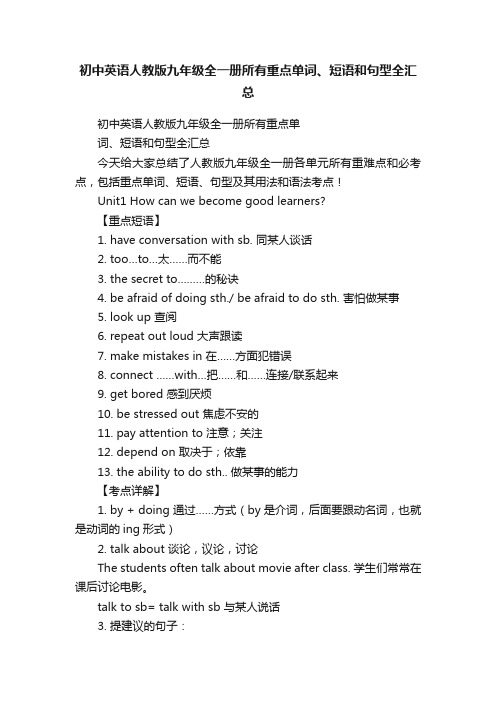
初中英语人教版九年级全一册所有重点单词、短语和句型全汇总初中英语人教版九年级全一册所有重点单词、短语和句型全汇总今天给大家总结了人教版九年级全一册各单元所有重难点和必考点,包括重点单词、短语、句型及其用法和语法考点!Unit1 How can we become good learners?【重点短语】1. have conversation with sb. 同某人谈话2. too…to…太……而不能3. the secret to………的秘诀4. be afraid of doing sth./ be afraid to do sth. 害怕做某事5. look up 查阅6. repeat out loud 大声跟读7. make mistakes in 在……方面犯错误8. connect ……with…把……和……连接/联系起来9. get bored 感到厌烦10. be stressed out 焦虑不安的11. pay attention to 注意;关注12. depend on 取决于;依靠13. the ability to do sth.. 做某事的能力【考点详解】1. by + doing 通过……方式(by是介词,后面要跟动名词,也就是动词的ing形式)2. talk about 谈论,议论,讨论The students often talk about movie after class. 学生们常常在课后讨论电影。
talk to sb= talk with sb 与某人说话3. 提建议的句子:①What/ how about +doing sth.? 做…怎么样?(about后面要用动词的ing形式,这一点考试考的比较多)如:What/ How about going shopping?②Why don't you + do sth.? 你为什么不做…?如:Why don't you go shopping?③Why not + do sth. ? 为什么不做…?如:Why not go shopping?④Let's + do sth. 让我们做…...吧。
初中英语介词语法-常考介词短语汇总及区分
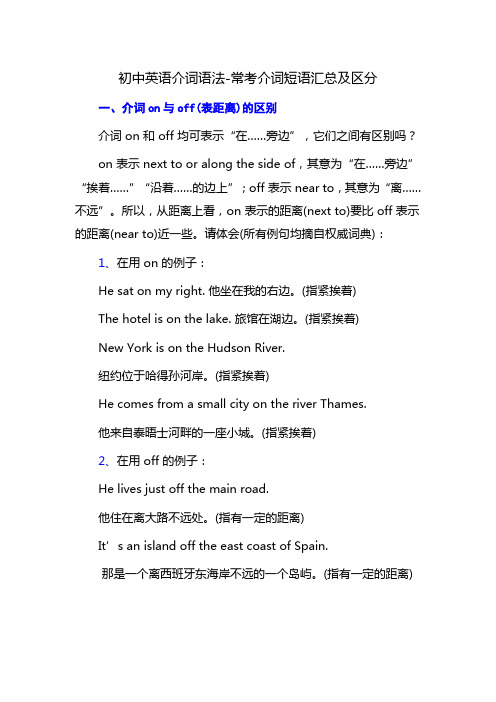
初中英语介词语法-常考介词短语汇总及区分一、介词on与off(表距离)的区别介词 on 和 off 均可表示“在……旁边”,它们之间有区别吗?on 表示 next to or along the side of,其意为“在……旁边”“挨着……”“沿着……的边上”;off 表示 near to,其意为“离……不远”。
所以,从距离上看,on 表示的距离(next to)要比 off 表示的距离(near to)近一些。
请体会(所有例句均摘自权威词典):1、在用 on 的例子:He sat on my right. 他坐在我的右边。
(指紧挨着)The hotel is on the lake. 旅馆在湖边。
(指紧挨着)New York is on the Hudson River.纽约位于哈得孙河岸。
(指紧挨着)He comes from a small city on the river Thames.他来自泰晤士河畔的一座小城。
(指紧挨着)2、在用 off 的例子:He lives just off the main road.他住在离大路不远处。
(指有一定的距离)It’s an island off the east coast of Spain.那是一个离西班牙东海岸不远的一个岛屿。
(指有一定的距离)The poor old man lived in a lonely house off the main road. 这位可怜的老人住在离大路不远的一座孤零零的房子里。
(指有一定的距离)二、介词without用法归纳1、基本用法1. (表否定)没有,无,不需。
如:The letter was posted without a stamp.那封信没贴邮票就寄出去了。
We got there without any trouble.我们到了那儿,一路上没遇到任何麻烦。
You’ll get wet if you go out in the rain without an umbrella. 雨天外出不带伞会淋湿的。
初中英语易混词辨析

初中英语易混词辨析-CAL-FENGHAI.-(YICAI)-Company One1中考易混淆的同义词总结1.say, speak, talk, tell这四个词都有“说”的意思,其用法差异主要在于各自强调的对象、内容不同。
(1)say的意思是“说”、“讲”、“说出”,是及物动词,强调“说”的内容。
不仅可指口头“说”,而且可指书面“说”。
eg: ① He said nothing to me. 他对我什么也没说。
② He said in his letter that he was getting on well with his life.他在信中说,他生活得很好。
固定搭配:say hello/good bye/sorry to sb. 向某人问候/告别/道歉say “ yes ” to sb . = agree with sb. 同意某人say “ no ” to sb. = disagree with sb. 不同意某人(2) speak表“说”、“讲”,它可以表示任何一种方式的“说话”。
它着重“说话”这一动作本身,而不强调所“说”的内容。
它通常为不及物动词,但它也可以作及物动词,后接the language、the truth、a word等,或接表示语言名称的名词。
eg: ①Please speak more slowly and clearly. 请说慢些和清楚些。
②Who is speaking 你是谁(打电话时用语)③Can you speak Japanese 你会讲日语吗固定搭配:speak to sb. 对某人说话speak highly of 称赞speak one’s mind 说心里话; 直言不讳(3) talk表示“交谈”、“谈话”,它指连贯地与人交谈,着重指说话的动作,而不强调说话的内容。
它一般用作不及物动词。
eg:①What are you talking about 你们在谈论什么②We are talking about the Chinese football match.我们在谈论中国足球比赛。
初中英语相似(易混)短语辨析
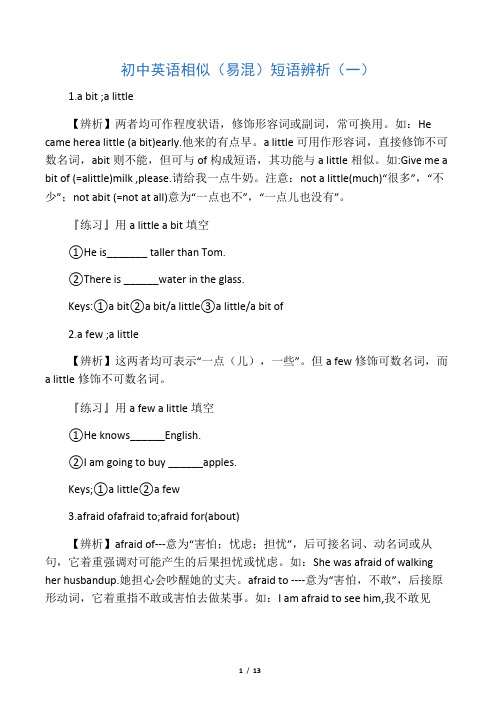
初中英语相似(易混)短语辨析(一)1.a bit ;a little【辨析】两者均可作程度状语,修饰形容词或副词,常可换用。
如:He came herea little (a bit)early.他来的有点早。
a little可用作形容词,直接修饰不可数名词,abit则不能,但可与of构成短语,其功能与a little相似。
如:Give me a bit of (=alittle)milk ,please.请给我一点牛奶。
注意:not a little(much)“很多”,“不少”;not abit (=not at all)意为“一点也不”,“一点儿也没有”。
『练习』用a little a bit填空①He is_______ taller than Tom.②There is ______water in the glass.Keys:①a bit②a bit/a little③a little/a bit of2.a few ;a little【辨析】这两者均可表示“一点(儿),一些”。
但a few修饰可数名词,而a little修饰不可数名词。
『练习』用a few a little填空①He knows______English.②I am going to buy ______apples.Keys;①a little②a few3.afraid ofafraid to;afraid for(about)【辨析】afraid of---意为“害怕;忧虑;担忧”,后可接名词、动名词或从句,它着重强调对可能产生的后果担忧或忧虑。
如:She was afraid of walking her husbandup.她担心会吵醒她的丈夫。
afraid to ----意为“害怕,不敢”,后接原形动词,它着重指不敢或害怕去做某事。
如:I am afraid to see him,我不敢见他。
afraid for (about)意为“替某人(事)担心”,其后接人或事。
初中英语考试必考重点词语辨析汇总
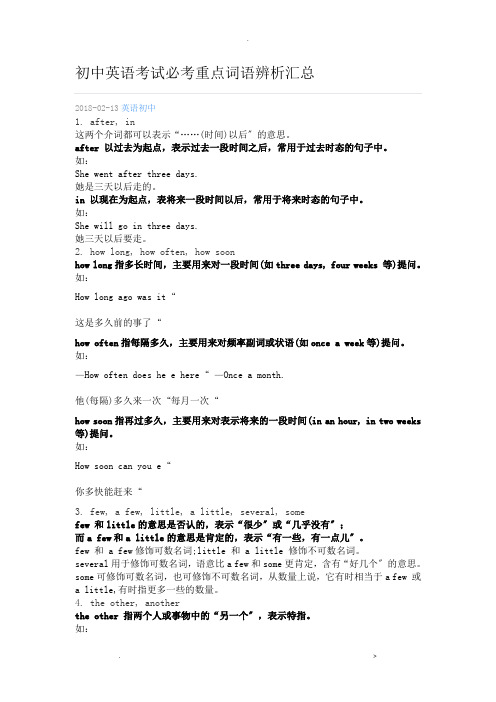
初中英语考试必考重点词语辨析汇总2018-02-13英语初中1. after, in这两个介词都可以表示“……(时间)以后〞的意思。
after 以过去为起点,表示过去一段时间之后,常用于过去时态的句子中。
如:She went after three days.她是三天以后走的。
in 以现在为起点,表将来一段时间以后,常用于将来时态的句子中。
如:She will go in three days.她三天以后要走。
2. how long, how often, how soonhow long指多长时间,主要用来对一段时间(如three days, four weeks 等)提问。
如:How long ago was it“这是多久前的事了“how often指每隔多久,主要用来对频率副词或状语(如once a week等)提问。
如:—How often does he e here“—Once a month.他(每隔)多久来一次“每月一次“how soon指再过多久,主要用来对表示将来的一段时间(in an hour, in two weeks 等)提问。
如:How soon can you e“你多快能赶来“3. few, a few, little, a little, several, somefew 和little的意思是否认的,表示“很少〞或“几乎没有〞;而a few和a little的意思是肯定的,表示“有一些,有一点儿〞。
few 和 a few修饰可数名词;little 和 a little 修饰不可数名词。
several用于修饰可数名词,语意比a few和some更肯定,含有“好几个〞的意思。
some可修饰可数名词,也可修饰不可数名词,从数量上说,它有时相当于a few 或a little,有时指更多一些的数量。
4. the other, anotherthe other 指两个人或事物中的“另一个〞,表示特指。
2024年人教版初中重点英语短语汇总
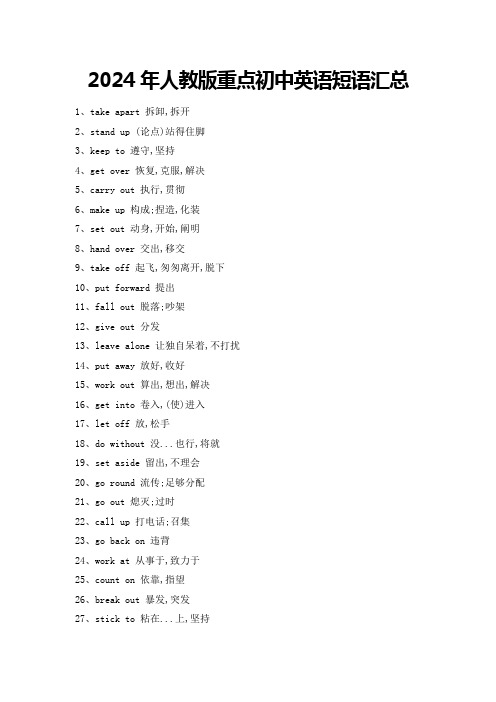
2024年人教版重点初中英语短语汇总1、take apart 拆卸,拆开2、stand up (论点)站得住脚3、keep to 遵守,坚持4、get over 恢复,克服,解决5、carry out 执行,贯彻6、make up 构成;捏造,化装7、set out 动身,开始,阐明8、hand over 交出,移交9、take off 起飞,匆匆离开,脱下10、put forward 提出11、fall out 脱落;吵架12、give out 分发13、leave alone 让独自呆着,不打扰14、put away 放好,收好15、work out 算出,想出,解决16、get into 卷入,(使)进入17、let off 放,松手18、do without 没...也行,将就19、set aside 留出,不理会20、go round 流传;足够分配21、go out 熄灭;过时22、call up 打电话;召集23、go back on 违背24、work at 从事于,致力于25、count on 依靠,指望26、break out 暴发,突发27、stick to 粘在...上,坚持28、wait on 服侍,侍候29、lay down 放下;制定30、come off 举行;成功;脱落31、hurry up (使)赶快,匆匆完成32、put up 建造,张帖,投宿33、give off 释放,放出34、hand in 交上,递交35、deal in 经营36、take to 开始喜欢,开始从事37、die down 变弱,逐渐消失38、ring up 打电话39、sum up 总结,概括40、catch up with 赶上41、fall through 失败,落空42、back down 放弃,让步43、laugh at 因...而笑,嘲笑44、get down 从...下来;写下45、pass on 伟授,传递46、give up 停止,放弃,辞去47、come out 出现;发现;结果是48、turn off 拐 弯,关上49、check in 办理登记手续50、hold out 伸出;坚持;不屈服51、figure out 计算出,想出52、get on with 友好相处;进展53、get in 进入;收获;插话54、fall back on 求助于55、take over 接管,借用56、look into 调查,观察57、get on to 转入;同...联系58、come up against 偶然遇到59、look down upon 看不起,轻视60、go up 上升,增长;被炸毁61、give away 赠送;泄露62、run away with 偷走,大量消耗63、run over 压过去,溢出64、pull off 脱(衣,帽)65、send in 呈递,提交66、break away 突然离开,强行逃脱67、refer to...as 把...称作68、draw on 动用,利用,吸69、come up 出现;走上前来70、mix up 搅匀,混淆71、pass away 去世72、hold back 踌躇;阻挡;隐瞒73、switch on 开启74、lay out 安排,布置;摆出75、put over 解释清楚,说明76、turn to 变成,求助于77、go without 没有...而将就对付78、throw away 扔掉,抛弃,浪费79、bring down 打倒;降低80、cut across 抄近路穿过81、get out 离去;泄露;取出82、run out(of) 用完,耗尽83、stand up to 勇敢面对,经得起84、wipe out 消灭85、turn on 打开86、answer for 对...负有责任87、fall in with 同意;依从88、let out 放走,释放,发出89、bring up 教育,培养90、try out 试用,试验91、head for 走向92、allow for 考虑到93、go into 叙述;调查;从事;被用于94、draw up 起草,制定;使停住95、pay off 还清;取得好结果96、break into 强行闯入97、run through 贯穿,浏览98、keep down 压缩,控制,镇压99、slow up 放慢,减速100、use up 用光101、do away with 废除,去掉102、scrape through 勉强通过103、keep on坚持做104、look out 注意,留神105、slow down 放慢,减速106、run into 偶到,偶然碰见107、get away 离开;逃脱108、watch out(for) 密切注意,提防109、look on 观看,旁观110、go in for 从事;爱好111、leave behind 忘了带;遗留112、let down 放下,降低;使失望113、dress up 盛装打扮114、live on 靠...生活115、hand out 分发,散发116、put off 推迟,阻止,劝阻117、try on 试穿118、back up 倒退,支持119、burn up 烧光,烧毁,烧起来120、ring off 挂断电话121、give back 归还122、show up 来到,露面123、add up to 合计达124、keep up with 跟上125、spring up 涌现126、build up 逐步建立;增强127、think over 仔细考虑128、come up with 提出129、care for 照料;喜欢130、turn over 仔细考虑131、throw up 呕吐132、get down to 开始,着手133、turn down 拒绝,调低134、think of 想起,考虑,想一想135、go by (时间)过去;遵守136、come to 苏醒;总数为137、go down 下降;减少,被接受138、hold onto 紧紧抓住139、take up 开始从事,占据140、keep back 隐瞒;保留;阻止141、set about 开始,着手142、look over 把...看一遍,察看143、shake off 摆脱,甩掉144、drop out 退出,退学145、go after 追求146、pull down 拆毁,降低147、live up to 遵守;不辜负148、stand out 引人注目149、look back 回头看;回顾150、hold up 延迟;展示151、think of...as 把...看作是152、wear off 渐渐减少/消失153、turn out 结果是,生产,关掉154、see to 注意,负责,照料155、cut in 插嘴,打断156、get through 完成;度过;被理解157、carry off 拿走,夺走158、lay aside 搁置一旁;储存159、break in 闯入;插嘴160、hang on 不挂断; 稍等; 坚持161、come on 进展;发生162、drop off 睡着;让下车,下降163、deal with 处理;论述,涉及164、look in 顺便访问/看望165、see about 办理,安排166、put on 穿上,上演,增加167、hang onto(on to) 紧紧抓住168、set apart 使分离169、look after 照料,注意,关心170、go along with 赞同,支持171、run down 说坏话,用坏172、clear away 把...清除掉,收拾173、die out 消失,灭绝174、keep off (使)不接近,(使)让开175、get across (使)被了解176、feel like 想要177、see off 送行178、stand by 旁观,支持,遵守179、make for 走向;导致,促成180、get off 下来;逃脱惩罚181、send for 派人去请/拿/接/取182、tune in(to) 收听183、have on 穿着,戴着184、knock out 击昏,击倒185、put up with 容忍,忍受186、double up 弯着身子,弯曲187、leave off 停止,中断188、send off 邮寄,发送189、cut down 削减,减少190、wash up 洗(餐具/手脸)191、settle down 定居;静下心来192、hand on 把...传递下去193、bring out 出版,推出;使显出194、carry on 继续195、cut out 割去,删去196、hold on 握住不放;等一会197、cut back 急忙返回;缩减198、go for 选择;袭击;适用于199、cheer up 高兴/振作起来200、refer to 提到,参考201、go off 爆炸,响起,断电202、switch off 关掉203、touch on 谈及,提及204、drop by 顺便来访205、wind up 结束,上发条206、bring forward 提出,提议207、improve on 改进,超过208、check out 结帐离去209、show off 炫耀,卖弄210、put down 记下,放下,镇压211、pull up (使)停下212、look up 查(词典)213、keep up 继续下去,坚持214、wear out 穿破,磨损,用坏215、pay back 偿还;回报;报复216、set up 建立,建造,开业217、take in 欺骗,领会,接受218、hang about 闲荡,闲呆着219、put in 花费,付出,申请220、ask for 要,要求221、go through 遭受,经历;检查,被通过222、stand for 是...的缩写,代表,主张223、pull on 穿,带224、break through 突围,突破225、take after 与...相像226、stand up for 支持,维护,保卫227、put out 熄灭,公布,生产228、see through 看穿,识破229、break up 打碎,粉碎;终止230、set off 出发,激起231、lay off 解雇232、get along 进展;过活233、look forward to 盼望;预期234、take away 减去235、set back 推迟,阻碍236、live through 度过,经受住237、go on 继续;进行;发生238、call on 访问,拜访239、knock down 击倒,撞倒240、draw in 到站241、count up 算出总数,共计242、get by 通过;过活243、get on 骑上,登上;有进展244、come through 经历...仍活着245、go over 检查,审查246、set down 写下,记下247、make out 写出,辨认出,理解248、ask after 探问,问候249、drop in 顺便来访250、pull in 进站,停下,靠岸251、pick out 辨认出,挑出252、pick up 拿起,带走,学会253、find out 查明,发现254、pull out 取出,驶出255、step up 加速,增加256、line up (使)排队257、break off 中止,中断258、clear up 放晴;清理259、go around 流传;足够分配260、cover up 掩盖,掩饰261、hand down 把...传下来262、put aside 储存,保留263、face up to 大胆面对264、turn up 出现265、fall behind 落后266、look through 浏览;详尽检查。
初中英语重点短语考点辨析

初中英语重点短语考点辨析考点短语解析1. fill/ fullⅠ.fill为及物动词,表“使……满”,常与介词with搭配,表达“被……充满”时用be filled with结构。
如:① The bottle is filled with water. 这只瓶子装满了水。
② He was filled with joy at the news. 听到这个消息,他内心充满了喜悦。
Ⅱ.full是形容词,多作表语,表示主语所处的状态,常见于be full of 结构中。
如:① The schoolbag is full of books. 书包里装满了书。
② He drew in an old badsket full of sand.他捞上来一个灌满泥沙的旧蓝子。
[注]:be filled with = be full of .可以互换。
但介词with与of 不能混淆。
如:The room is full of people. = The room is filled with people.2. final/ lastⅠ.final表终止或结束之意,有时带有决定性或结论性等意味。
如:① Today is the final day of this term. 今天是本学期的最后一天。
② We shall know the final results of the elections tomorrow. 明天我们将知道选举的最后结果。
Ⅱ.last “最后的、末尾的”指按次序的前后或时间的先后居于最后,并意味着后面不再有了。
如:① My house stands in the last row.② He was the last one to enter.3. finally/ at last/ in the end这三个都可以作“最后”讲,但用法不同。
Ⅰ.finally表动作的发生顺序是在“最后”,无感情色彩,只用于过去时,它居句首时较多。
初中英语常见词汇辨析

英语近义词辨析注意:“such+a/an +adj+可数名词单数形式”可与“so+adj+a/an+可数名词单数形式”转换。
She is such a kind girl.=She is so kind a girl.2.each和every注意:each不能与almost,nearly及not搭配使用,而every可以。
Almost every window was broken.Not every student went on holiday.Each不能用于否定句,在否定句中应用none。
None of the books are mine.H e lives alone but he doesn’t feel lonely.他独自生活,但并不感到孤独。
I t’s a lonely beach.那是一个人迹罕至的海滩。
4.stop doing sth与stop to do sth.English is one of my favorite subjects.One of my friends knows you.There are few eggs on the plate,so I must buy some.盘子里没几个鸡蛋了,所以我必须买一些There are a few eggs on the plate,so I needn’t buy any at once. There’s little milk in the glass.杯子里没多少牛奶了。
There’s a little milk in the glass.杯子里有一点牛奶。
我们班上任何人都知道这些歌手中的任何一个和他们歌曲中的任何一首。
这类形容词:interest和interesting、excited和exciting、surprised和surprisingThe boy was very excited when he heard the exciting news.Try做vi,意为“尝试、努力”I don’t think I can do it ,but I‘ll try.Try:做名词,”尝试”,have a try.“试一试”11.作“花费”:cost/spend/take /payI spent 200 yuan on a new coat.Don’t spend too much time watching TV.The dictionary cost me 89 yuan.It took Mr. Green an hour to finish his work yesterday.I paid 15 yuan for the pen .12.Through over acrossIt began to rain.However,we went out to look for the boy. You may be right but I don’t believe you.None of us went to the park.No one wants to leave.——who like that place?>——no one.Jim was writing a letter when I came in.另外,while 还可意为“而;然而”,表示两种情况的对比。
初中英语常用词语辨析完整版
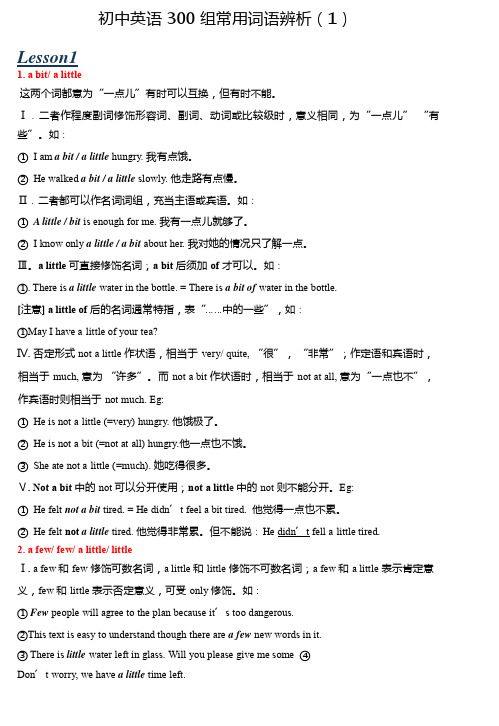
初中英语 300 组常用词语辨析(1)Lesson11. a bit/ a little这两个词都意为“一点儿”有时可以互换,但有时不能。
Ⅰ.二者作程度副词修饰形容词、副词、动词或比较级时,意义相同,为“一点儿”“有些”。
如:①I am a bit / a little hungry. 我有点饿。
②He walked a bit / a little slowly. 他走路有点慢。
Ⅱ.二者都可以作名词词组,充当主语或宾语。
如:①A little / bit is enough for me. 我有一点儿就够了。
②I know only a little / a bit about her. 我对她的情况只了解一点。
Ⅲ。
a little 可直接修饰名词;a bit 后须加of 才可以。
如:①. There is a little water in the bottle. = There is a bit of water in the bottle.[注意]a little of后的名词通常特指,表“……中的一些”,如:①May I have a little of your tea?Ⅳ. 否定形式 not a little 作状语,相当于very/ quite, “很”,“非常”;作定语和宾语时,相当于much, 意为“许多”。
而not a bit 作状语时,相当于not at all, 意为“一点也不”,作宾语时则相当于not much. Eg:①He is not a little (=very) hungry. 他饿极了。
②He is not a bit (=not at all) hungry.他一点也不饿。
③She ate not a little (=much). 她吃得很多。
Ⅴ. Not a bit中的not 可以分开使用;not a littl e 中的not 则不能分开。
Eg:①He felt not a bit tired. = He didn’t feel a bit tired. 他觉得一点也不累。
- 1、下载文档前请自行甄别文档内容的完整性,平台不提供额外的编辑、内容补充、找答案等附加服务。
- 2、"仅部分预览"的文档,不可在线预览部分如存在完整性等问题,可反馈申请退款(可完整预览的文档不适用该条件!)。
- 3、如文档侵犯您的权益,请联系客服反馈,我们会尽快为您处理(人工客服工作时间:9:00-18:30)。
1. a bit/ a little这两个词都意为“一点儿”有时可以互换,但有时不能。
Ⅰ.二者作程度副词修饰形容词、副词、动词或比较级时,意义相同,为“一点儿”“有些”。
如:①I am a bit / a little hungry. 我有点饿。
②He walked a bit / a little slowly. 他走路有点慢。
Ⅱ.二者都可以作名词词组,充当主语或宾语。
如:①A little / bit is enough for me. 我有一点儿就够了。
②I know only a little / a bit about her. 我对她的情况只了解一点。
Ⅲ。
a little可直接修饰名词;a bit后须加of才可以。
如:①. There is a little water in the bottle. = There is a bit of water in the bottle.[注意] a little of 后的名词通常特指,表“……中的一些”,如:①May I have a little of your tea?Ⅳ. 否定形式not a little 作状语,相当于very/ quite, “很”,“非常”;作定语和宾语时,相当于much, 意为“许多”。
而not a bit 作状语时,相当于not at all, 意为“一点也不”,作宾语时则相当于not much. Eg:①He is not a little (=very) hungry. 他饿极了。
②He is not a bit (=not at all) hungry.他一点也不饿。
③She ate not a little (=much). 她吃得很多。
Ⅴ. Not a bit 中的not 可以分开使用;not a littl e中的not 则不能分开。
Eg:①He felt not a bit tired. = He didn’t feel a bit tired. 他觉得一点也不累。
②He felt not a little tired. 他觉得非常累。
但不能说:He didn’t fell a little tired.2. a few/ few/ a little/ littleⅠ. a few和few修饰可数名词,a little和little修饰不可数名词;a few和a little表示肯定意义,few和little表示否定意义,可受only修饰。
如:①Few people will agree to the plan because it’s too dangerous.②This text is easy to understand though there are a few new words in it.③There is little water left in glass. Will you please give me some④Don’t worry, we have a little time left.3. about/ onⅠ.about “关于”表示的内容较为普通或指人时用它。
侧重于叙事,多用于叙述个人经历和事迹,故事内容涉及一些较浅的问题。
是非正式用语。
Ⅱ.on “关于”侧重于论述政治理论,国际形势,学术报告等。
也就是说,当表示这本书,这篇文章或演说是严肃的或学术性的可供专门研究这一问题的人阅读时用。
eg:This is a text book on African history. 这是一本关于非州历史的教科书。
[注]:它们有时可通用。
4. above/over/on/uponⅠ. 方位介词,“在……之上”Ⅱ. above 着重指:在……上方,不一定含有垂直在上的意思。
反义词为: below.①The sun rose above the horizon. 太阳升到了地平线上。
②The aero plane flew above the clouds.飞机在云层上飞行。
Ⅲ.over 表盖在……上面,或铺在……上面。
此时不能用above.代替。
含有垂直在上的意思。
反义词为under.①Spread the tablecloth over the table.把桌布铺在桌子上。
Ⅳ. on 含有与表面相接触的意思。
①The book is on the desk.②There is an oil painting on the wall. 墙上有一幅油画。
Ⅴ.upon 也含有和表面相接触的意思。
与on没有多大的区别,但较正式,口语中较少用。
①He laid his hand upon the boy’s head. 他把手放在孩子的头上。
[注] up 与以上几个不同,它表示向上方或高处,含有由下而上,由低而高的意思。
常和表示运动的动词连用。
作副词时,表示在上方或高处。
①We run up a hill. 我们跑上山。
②The plane was high up in the air.飞机在高空中。
5. accident/incident “事故”Ⅰ. accident 可以表示事故,指不幸的意外事件。
也表偶然的事件。
①Twenty people were killed in the railway accident②He met with an accident. 这完全是偶然的事。
Ⅱ. Incident 的意思是事件,尤指与较重大的事件相比,显得不重要的事件。
它还可以表引起国际争端或战争的事件。
①It is a quite common incident.这是很普通的事。
②The Lugouqiao incident accrued on July 7th, 1937. 芦沟桥事件发生于1937年7月7日。
6. accept/receiveⅠ. accept “接受”,表示其行为是由主观意愿决定的。
①I accepted it without question. 我毫无疑问地接受了它。
②We have accepted his proposal. 我已接受了他的建议。
Ⅱ. receive “接到、收到、受到”表示其行为与主观意愿无关。
如:①I received a letter from him. 我收到了他的来信。
②He received the present, but he did not accept. 他收到了礼物,但没有接受下来。
③He received a good education.他受到了良好的教育。
[注] 在表示接待、接见时,通常用receive, 而不用accept.如:We often receive foreign guests. 我们经常接待外宾。
7. at hand/ in handⅠ. at hand“在手边;在附近;即将到来”如:①When he writes, he always keeps a dictionary at hand. 他写东西时,手边总有一本字典。
②Spring is at hand. 春天就要来了。
Ⅱ. in hand “在手中的;现有的”引申为:“在掌握中;在处理中”。
如:①I have 100 yuan in hand. 我手头有100元钱。
②The police immediately had the situation in hand. 警方立即控制了局势。
8. accurate/exact/correctⅠ. accurate “准确、精确”不仅表无错误,且表细心,谨慎地做到符合标准,符合事实或真象。
如:①Clocks in railway stations must be accurate.火车站的钟必须准确。
②The figures are not accurate.这些数字不精确。
Ⅱ. exact “精确、确切”强调完全符合标准,符合事实或真象,丝毫没有差错。
它这三个中语意最强。
如:①His translation is exact to the letter. 他的翻译翻译确切。
②Your description is not very exact.你的描述不很确切。
Ⅲ.correct. “正确”指按照一定的标准或规则,而没有错误。
在这有一个词中,它的语意最弱。
①His answer is correct. 他的回答是正确的。
②The thing turned out to be correct. 事情结果是对的。
9. ache/pain “痛”Ⅰ. ache 通常指一种持续的隐痛。
它可以与表身体某部分的词,组成复合词。
如:①Where is the ache? 哪里痛?②I have a head ache (stomachache, toothache atc).Ⅱ. pain 是普通用语。
不含持续痛的意味,尤指一种突然的剧痛。
除指肉体上的外,还指精神的痛苦。
如:①I feel a great deal of pain. 我感到非常痛。
②He cried with pain. 他痛得直叫。
③I have a pain in the arm. 我手臂痛。
④I have pains all over. 我浑身痛。
⑤It gave us much pain to learn of the sad news. 听到不幸的消息很悲痛。
10. across/through/ overⅠ. across “横过、穿过”,指从……的一边到另一边。
含义与on有关。
如:①I swam across the river. 我游过这条河(指从此岸到彼岸)②Let’s help push the cart across the bridge.我们帮着把车子推过桥吧。
Ⅱ. through “穿过、通过”指穿过两边。
是从空间较狭窄的一头穿到另一头。
是从内部穿过,含义与in有关。
如:①We walked through the forest. 我们穿过森林。
②The river flows through the city from west to east. 这条河从西到东流过城市。
Ⅲ. over“横过、跨越”指横过道路、河流等“细长物”时,与across通用。
Over虽可指从表面的接触及跳(飞)越,但指渡过则不能用。
从房间、原野、海洋等“平面延伸”的一端横越到另一端时也不能使用。
而常用across.①She went across / over the bridge.②He jumped across / over the stream他跳过了小溪。
③She swam across the straight of Dover. 她游过了多佛尔海峡。
